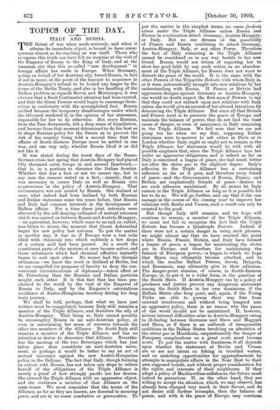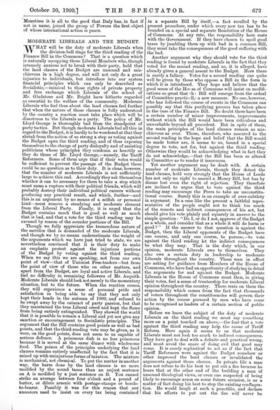TOPICS OF _ THE DAY.
ITALY AND RUSSIA.
THE threat of war when made seriously, and when it attains its immediate object, is bound to have conse- quences almost as far-reaching as war itself. Those who recognise this truth can have felt no surprise at the visit of the Emperor of Russia to the King of Italy, and at the immense stir that this so-called "new development" in foreign affairs has made in Europe. When Germany, acting on behalf of her Austrian ally, forced Russia, in fact if not in name, at the point of the bayonet to acquiesce in Austria-Hungary's refusal to be bound any longer by the terms of the Berlin Treaty, and also in her handling of the Balkan problem as regards Servia and Montenegro, it was obvious that a fresh Continental situation had been created, and that the Great Powers would begin to rearrange them- selves in conformity with the accomplished fact. Russia yielded because the temporary disadvantages under which she laboured rendered it, in the opinion of her statesmen, impossible for her to do otherwise. But every Russian, from the Tsar downwards, felt a deep sense of humiliation, and became from that moment determined to do his best so to shape Russian policy for the future as to prevent the risk of his country being told a second time that the affairs of South-Eastern Europe must be settled in one way, and one way only, whether Russia liked it or did not like it.
It was stated during the worst days of the Russo- German crisis last spring that Austria-Hungary had placed fifty thousand extra troops in and around Innsbruck,— that is, in a position to threaten the Italian frontier. Whether this was a fact or not we cannot say, but in any case the rumour rested on a fact,—namely, that it was necessary to coerce Italy as well as Russia into acquiescence in the policy of Austria-Hungary. That circumstance was not missed by Russia. She realised at once, what indeed had been realised by both Russian and Italian statesmen some ten years before, that Russia and Italy had common interests in the development of Balkan affairs. For a time these joint interests were obscured by the self-denying ordinance of mutual reticence which was agreed on between Russia and Austria-Hungary, —an agreement, however, which came to an end, or, rather, was blown to atoms, the moment that Count Aehrenthal began his new policy last autumn. To put the matter in another way, it was as if Europe were a test tube filled with chemicals into which suddenly a few drops of a certain acid had been poured. As a result the constituent parts of the mixture at once became active, and those substances which had chemical affinities instantly began to seek each other. No sooner had the German ultimatum—we know the word is disliked at Berlin, but we are compelled for purposes of brevity to drop the con- ventional circumlocutions of diplomacy—taken effect at St. Petersburg than the Russian and Italian particles sought each other. It is this fact that has been pro- claimed to the world by the visit of the Emperor of Russia to Italy, and by the Emperor's ostentatious avoidance of Austro-Hungarian territory during his long train journey. We shall be told, perhaps, that what we have just written must be exaggerated, because Italy still remains a member of the Triple Alliance, and therefore the ally of Austria-Hungary. That being so, Italy cannot possibly be encouraging Russia in an anti-Austrian policy, or even in maintaining her sense of soreness towards the other two members of the Alliance. No doubt Italy still remains a member of the Triple Alliance, and has no intention or desire- to denounce that Alliance. Neverthe- less the meeting of the two Sovereigns which has just taken place does constitute an anti-Austrian move- ment, or perhaps it would be better to say an act of mutual insurance against the new Austro-Hungarian policy in the Balkans. The fact that Italy, though forming an entente with Russia, has not taken any steps to relieve herself of the obligations of the Triple Alliance is merely a proof of how strongly pacific are her desires. She entered the Triple Alliance with no aggressive object, and she continues a member of that Alliance on the -eine terms. We must remember that the terms of the Alliance, as far as they are known, are directed to securing peace, and are in no sense combative or provocative. To put the matter in the simplest terms, no casus foederis arises under the Triple Alliance unless Russia and. France in combination attack Germany, Austria-Hungary, or Italy. But no one dreams of the possibility of France and Russia combining to attack Germany, Austria-Hungary, Italy, or any other Power. Therefore the fact of Italy remaining in the Triple Alliance cannot be considered as in any way hostile to her new friend. Russia would not dream of expecting her to show her good faith by any such action as an abandon- ment of the Triple Alliance, for Russia does not want to disturb the peace of the world. It is the same with the other Powers of the Tripartite Entente, 'with whom Italy is, as it were, automatically brought into new relations by her understanding with Russia. If France or Britain had aggressive designs against Germany or Austria-Hungary, one would no doubt expect the first-named Powers to say that they could not embark upon new relations with Italy unless she would give an earnest of her altered intentions by denouncing the Triple Alliance. But since all that Britain and France want is to preserve the peace of Europe and maintain the balance of power, they do not find the least cause of danger, or even of annoyance, in Italy remaining in the Triple Alliance. We feel sure that we are not going toe far when we say that, supposing Italian statesmen were to-morrow to ask either in Paris or in London whether Italy ought or ought not to remain in the Triple Alliance, her statesmen would be told with all possible emphasis that, since the Triple Alliance lays her under no aggressive obligations, and is indeed as far as Italy is concerned a league of peace, she had much better not alter the status quo in the slightest degree. Italy's adhesion to the Triple Alliance has a restraining influence as far as it goes, and therefore every friend of peace—and the Governments of Russia, France, and Britain are emphatically friends of peace—desires to see such adhesion maintained. By all means let Italy remain in the Triple Alliance as long as it is possible for her to do so. We will go further, and. say that if she can manage in the course of the coming year to improve her relations with Berlin and Vienna, such a result can only be counted to the good. But though Italy still remains, and we hope will continue to remain, a member of the Triple Alliance, we must not fail to recognise the fact that the Triple Entente has become a Quadruple Entente. Indeed, if there were not a certain danger in using such phrases, we might almost say that we have reached the point where Russia, France, Britain, and Italy have formed a league of peace, a league for maintaining the status quo in Europe, and therefore for maintaining the balance of European power,—a league to which we hope that Spain may ultimately become attached, and to which the smaller Balkan Powers, Servia, Bulgaria, and Roumania, may ultimately give in their adhesion. The danger-point remains, of course, in South-Eastern Europe, or, to put it in a wider form, in the question of the South Slays. If Austria-Hungary can by a policy of prudence and justice prevent any dangerous movement among the South Slays in her own dominions, if the Balkan States also keep quiet, and, again, if the Young Turks are able to pursue their way free from external interference and without being tempted into an aggressive policy, there is no reason why the peace of the world should not be maintained. If, however, serious internal difficulties arise in Austria-Hungary owing to ill-feeling between Germans and Slays and Magyars and Slays, or if there is an outbreak of irresponsible ambitions in the Balkan States involving an alteration of the status quo in Macedonia, unquestionably the danger of European complications on a great scale must become acute. To put the matter with frankness, it all depends upon whether the statesmen at Berlin and Vienna are or are not intent on fishing in troubled waters, and on snatching opportunities for aggrandisement by attempts to manipulate affairs in the Near East to their own supposed benefit, and without proper consideration for the rights and interests of their neighbours. If they - adopt a policy of Machiavellian selfishness, the future must indeed be precarious. If, on the other hand, they are willing to accept the situation, which, we may observe, has already been changed very much in their favour, and do not desire still further triumphs, then the balance of power, and with it the peace of Europe, may continue. -Meantime it is all to the good that Italy has, in fact if not in name, joined the group of Powers the first object of whose international action is peace.











































 Previous page
Previous page